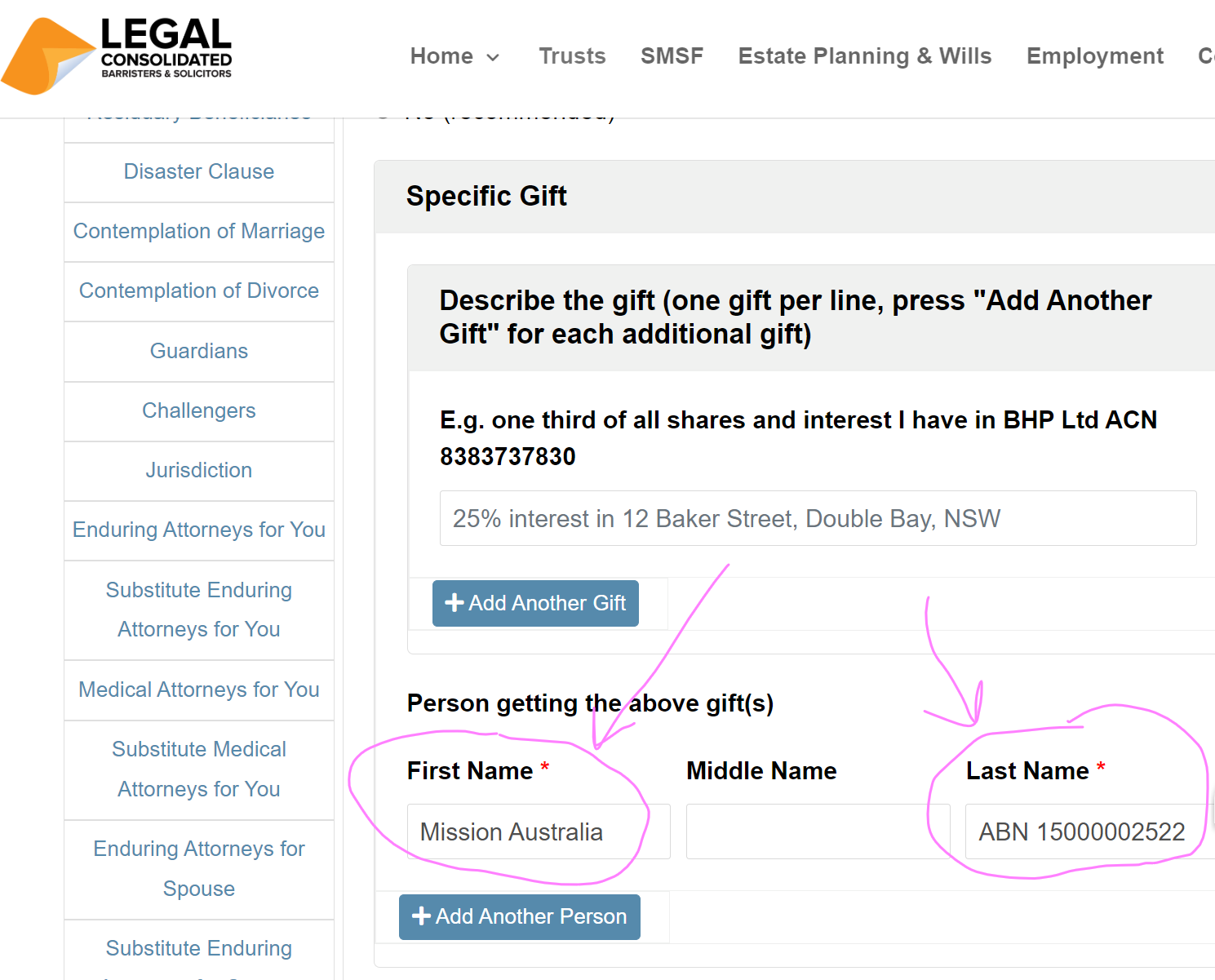Using a Power of Attorney to steal money
In Estate Planning, you have many ways of protecting yourself and your family. For example, in your Will, you can put in a Divorce Protection Trust and make Loans to Children while you are alive.
However, while you are still alive, Enduring POAs and Medical/Lifestyle POAs are the biggest protection.
While different states and territories use different expressions, the person receiving your POA is the donee. The donee is often your spouse and children. But it can be anyone you trust. The donee ‘stands in your shoes’. Whatever you can do, the donee can generally do. For example, the donee you appoint can buy and sell property for you. They can operate your bank accounts.
Obviously, there are limits. For example, the donee cannot make a Will or vote for you.
Can an Australian POA be used against your wishes?
Can the donee use your POA for personal gain? What if this helps you as well? What if your spouse or child taking your money is in your ‘best interests’?
While you are of sound mind, you must direct your attorneys. You remain in control.
An ‘enduring’ POA has a unique quality. If you become of unsound mind, the POA continues to operate. Your donee continues to stand in your shoes. The donee must now ‘guess’ what is in your best interest. But now we have a problem. Who is checking what your donee is doing?
How much power does the donee have? Can the donee use the POA for his own personal profit? Is this an abuse of power? Is this elder abuse? Is it legal?
An attorney can not use the POA for their own advantage
An important responsibility of attorneys under an enduring POA is that by agreeing to carry out the responsibilities of an attorney, they are under a fiduciary duty not to obtain an advantage. This is for themselves. They are not allowed to act in a way that is contrary to your interests.
Consider the case of Powell v Thompson [1991] 1 NZLR 597. It is about a POA given to their mother by two daughters going overseas:
An attorney cannot utilise a power of attorney to pay his or her personal debts. To do so contravenes the fundamental nature of an agency or fiduciary relationship. The powers of attorney are specifically directed at the management of the principal’s affairs: it is not open to attorneys to either obtain an advantage for themselves or to act in a way which is contrary to the interests of their principals.
These are useful cases on your obligations under a POA:
- Greenland v Intellectually Disabled Citizens of Queensland [2000] QSC 84 [30];
- Re KJS [2003] QGAAT 27 [61]; and
- Klotz & Klotz v Neubauer & Klotz [2001] SASC 454 [33]-[37].
My son is dying. Can I use my wife’s POA to save our son?
The husband runs a business. Like all business owners, he has a high risk of bankruptcy. You follow the asset protection strategy of ‘man of straw, wife of substance‘. Therefore, he puts all his money into his wife’s name. But his wife loses her mental capacity.
He needs $1m to pay doctors for their terminally ill son. Can the husband use his wife’s POA to pay for their son’s medical treatment?
Some states, including New South Wales, Queensland, Victoria, and Tasmania, allow the husband to give gifts to relatives. However, gifts are limited to special events and do not include medical benefits. Therefore, the husband cannot pay for his son’s medical treatment as a gift.
Queensland is the only state that allows the husband (as donee) under a QLD POA to pay for their son’s medical treatment. (Some states and territories may allow the spending of the money, but only via court proceedings.)
The husband has no power to draw finances under the Enduring POA for medical treatment for himself or their son. Sadly, the husband must act in good faith. He must only act in his wife’s best interest when using her finances. Saving the life of her son is not acting in her best interest. It is acting in her son’s best interest.
Can children steal from their parents using a POA?
Your children hold your Enduring POA. Let us say you are of unsound mind. As donees, the children control your finances. Can your children move assets from your name into their names?
You have dementia. Therefore, you lack mental capacity. You need to move into an aged care facility in 6 years’ time. But you are too wealthy to qualify for subsidised home care. However, can your children use your POA to put many of your assets in their names? And then you qualify. Can the children do this under your POA?
The answer, again, is no. Under the POAS, the children must act in the parents’ best interest. Stealing their father’s assets does not benefit their father and is not in his best interest.
Buy a Ferrari using Mum’s POA?
You and your mother dislike each other. You hold her POA. Your mother is of unsound mind and needs medical treatment. She is unable to drive a car. Despite your relationship, you decide to drive her to the hospital. Can you use your mum’s POA to buy yourself a Ferrari using her money?

Driving your mother to the hospital is acting in her best interests. Your mother is receiving benefits from your purchase of the Ferrari. (Obviously, you hold the Ferrari as bare trustee for your mum. After all, it is always her asset.)
A person holding a POA must act in the donor’s best interest. Driving your Mum to the hospital is in her best interests. And you need a car. And you may need to get there fast. So a Ferrari may be an acceptable purchase under Mum’s POA.
The Court in BJL (Guardianship) [2018] VCAT 142 stated:
“It is in the nature of a family trust that family members are appointed. It is also natural and common that persons appoint close family members as their attorneys. Conflict between the roles in such circumstances must be demonstrated not assumed. To conclude otherwise would mean that in every circumstance where a family member holds: (i) one role in a family trust and (ii) another role as an attorney for a family member who is a beneficiary of that trust – there is a disqualifying conflict of interests. This would implicate a great many persons’ estates.”
A POA is only used to protect the person that made the POA
So the POA cannot be used to save a child’s life and it cannot be used to save tax. But it can be used so that a child can swan around in a Ferrari!
Your attorney must act honestly and with reasonable diligence
Your POA attorneys must exercise the powers given to them:
- according to the terms of the enduring power of attorney;
- honestly; and
- with reasonable diligence
to protect your interests.
The Queensland provision creates a criminal offence and a right in the maker to seek compensation for losses caused by the enduring attorney’s failure to exercise their powers honestly and with due diligence. See Powers of Attorney Act 1998 (Qld) s 66 and Moylan v Richards [2010] QSC 327.
In South Australia and Western Australia, the legislation requires an enduring attorney to exercise their powers with reasonable diligence to protect the maker’s interests and makes them liable to the maker for any loss caused by their failure to do so.
In Tasmania, an enduring attorney is taken to be a trustee of the maker’s property and affairs according to the terms of the power of attorney and must exercise their powers to protect the maker’s interests. See Powers of Attorney Act 2000 (Tas) s 32A(1).
In Victoria, an enduring attorney must act honestly, diligently and in good faith. They must also exercise reasonable skill and care.
In the Northern Territory, a person appointed in an advance personal plan as a decision-maker for financial matters under the Advance Personal Planning Act (NT) is required to act honestly, with care, skill, and diligence.
So that leaves NSW and the ACT. Their legislation does not require your attorney to act honestly or with reasonable diligence. But this can be inferred in the intent of the legislation.
Did the daughter steal $120,000 from her mum?
I want you to consider these facts and what you could have done in your own family to reduce the chance of getting into this mess. Win or lose, the daughter and her family suffered by having to go to court.
These are criminal charges (not civil) laid against the daughter.
Daughter risking jail for alleged theft of $120,000 from sick mother
A daughter is accused of stealing $120,000. This is from her Alzheimer’s-affected mother. The daughter spent thousands of dollars on event tickets, dinners at Crown and jewellery. This is what the District Court was told.

Siham Carollisen, 33, is on trial for misusing a Power of Attorney (or, more correctly, an Administrative order). She pleads not guilty to stealing money using the POA.
State prosecutor Mr Ryan Arndt said the money the daughter spent on herself was supposed to be reserved for her mother’s living expenses.
“She treated it as if it were her own money,” he said.
The daughter transferred her mother’s $270,000 share from the family home sale to an account in her name.
But by June 2015, this money was almost all gone. Mr Arndt said there was “seemingly nothing to show for $270,000.”
The Mum gets Alzheimer’s.
The daughter argued that her mother gave permission to spend $275,000, including the $120,000 she is accused of stealing.
Under cross-examination, the daughter (a mother of two) admits she got massages for herself using Mum’s money.
Daughter cleared of stealing $120,000 from mother with Alzheimer’s
The decision? The daughter walks free from the District Court. This is after a jury took just 9 minutes to find her not guilty of stealing $120,000 from Mum.
She cries when the verdict is read out.
Lessons to learn when holding a POA
The daughter escapes this time, but it greatly strains her and her family. POAs and looking after people’s money come with huge responsibilities. You have to act in the person’s best interest, which is a difficult and subjective burden.
Responsibilities of attorneys under a POA
What happens when the person making a POA loses the capacity? This is often a permanent situation.
The enduring attorney is then your manager and decision-maker. This is for your financial affairs.
The relationship is one of principal and agent. But upon losing your mental capacity, you, as the principal, lose the capacity to sack your agent.
At that point, Legal Consolidated believes the fiduciary’s obligations (of utmost good faith) are increased.
The person now holding your enduring POA has a high ethical responsibility. Some are set out in each state’s legislation, and others are set by common law.
Queensland legislation provides the greatest help in carrying out an attorney’s responsibilities. See the Powers of Attorney Act 1998 (Qld). Legal Consolidated believes that all Australian POA attorneys should uphold Queensland obligations. It would be foolish and risky not to.
Can your Attorney disregard things you have told them?
You may give binding instructions to your attorney for an enduring power of attorney. But only when you are still of sound mind.
However, just because you are of unsound mind does not free up the attorney to start looking at what is in your best interest. For example, if you are Catholic and have made your views known, the attorney is not free to disregard that knowledge to work out what is in your best interests.
Acting against your instructions is a breach of the attorney’s trust. Consider the High Court of Admiralty in England’s decision in The Margaret Mitchell (1858) 166 ER 1174. The attorney sold a ship. But it was contrary to instructions. These instructions were not in the POA but could not be disregarded. Dr Lushington J stated:
I apprehend that, as a general rule, the grantee of a power of attorney is bound to follow the directions and wishes of the grantor, as, for instance, with respect to the power of attorney to sell stock, the grantee must exercise that power according to the orders of the grantor. I conceive that to use a power of attorney contrary to the known wishes and directions of the grantor, is a breach of trust.
This approach was adopted in Victoria in 1983, 2002, and 2004 in New South Wales. See Watson v Watson [2002] NSWSC 919, [49] and Dynayski v Grant [2004] NSWSC 1187, [19].
In R v Holt, Tadgell J of the Supreme Court of Victoria stated:
It is not the law that an attorney given power by instrument under seal may, so long as the instrument remains unrevoked, exercise the power it confers in disregard of any subsequent orders of his principal conveyed to him … there always resides in the donor the right later to instruct the donee not to act on the power, or to act only in a stated way. That the effect of a power of attorney, even if given under seal, may be modified by parole [verbally] is made clear by the decision of The Margaret Mitchell the authority of which has so far as I am aware never been doubted.
While I am of sound mind, can the POA be used against me?
In the Supreme Court of South Australia, Judge Burley clearly states that an attorney under an enduring power of attorney may not exercise powers conferred by the grant contrary to your wishes. This is when you have the mental capacity to give your attorney such directions. Even your verbal instructions must be followed.
Should your POA attorney still listen to you, even if you are of unsound mind?
You may have lost ‘mental capacity’, whatever that means, but your attorneys should still hear your views. This is if you wish to share them.
However, attorneys may not follow what an insane person wants. This is especially the case if it breaches their obligation to act with proper care and protection.
The Queensland and the ACT legislation encourage self-reliance. This includes giving the now incapable maker the necessary support and information. This is to participate in the making of financial decisions affecting their lives.
Similarly, Victorian legislation requires your attorney to keep you involved in financial decisions even after your decision-making ability is absent or impaired.
While other states and the NT do not enshrine this right in their legislation, the best practice is to listen and give the maker of the POA the right to be heard.
Can I use my Mum’s Enduring POA to build a granny flat on my home?
The challenge here is that building a dwelling on your property gives you, the donor, a personal advantage. Whether it increases the value of your home is only one of many issues that need to be considered.
On the other hand, it is to your Mum’s advantage to have a place to live for the rest of her life.
However, your spouse is cheating on you. You divorce here. The Family Court orders that the property be sold and the proceeds be split 50/50 between you and your spouse.
Mum is kicked out? How much money do you give her to replace her lost place?
Centrelink also considers a granny flat an asset. But a ‘home’ may be exempt. But a ‘gift’ to you, the child, to build the granny flat may foul the deprivation rules.
Ethical rules when using someone else’s EPOA to build a granny flat on your property
Consider the legal and ethical complexities of using an Enduring Power of Attorney to build a granny flat on your property with funds from your Mum’s account. Here are key points to address:
-
Principal’s Best Interest: Ensure that using the EPOA prioritises your mum’s needs over personal gains. The primary goal is to benefit her, not to enhance the value of your property.
-
Asset Value and Financial Gain: Improvements like building a granny flat can increase your property’s value. The document clearly states that the construction is for your Mum’s benefit to avoid potential legal challenges.
-
Family and Legal Dynamics: Personal circumstances, such as a divorce, can complicate the situation. If the property must be sold, outline how you will compensate your Mum for her investment and ensure her interests are safeguarded against future uncertainties.
-
Centrelink Implications: Using your Mum’s funds to build a granny flat might affect her Centrelink benefits. Check if the investment will be considered a gift, which might reduce benefits.
-
Practical Examples:
- If the granny flat is built for your Mum’s use, this scenario supports her well-being and is more acceptable under EPOA regulations.
- If the property is sold: You must detail how your Mum will be compensated for her contribution. Protect her rights and outline potential legal avenues to recover her investment.
- Centrelink Considerations: Consult with a financial advisor to understand how the construction might impact your Mum’s Centrelink assessments.
You must get a sign-off from your accountant, lawyer and financial planner. These three letters of comfort need to clearly state what you are doing and confirm that you are acting in your Mum’s best interest.
Use Mum’s POA to transfer money to me so Mum can get Centrelink pension?
Q: Mum has dementia. I have her Enduring POA. Dad has died. I am the only child, and Mum leaves everything to me in her Will. Our financial planner said that if I transfer about $380,000 out of Mum’s name, then in 5 years, under the deprivation rules, she can get a full pension. Can I use Mum’s POA to transfer the money to me?
A: Although your adviser noted that Mum could reduce her assets by $380,000 to qualify for the pension, they did not suggest you transfer the $380,000 to yourself! Doing so would be theft and elder abuse.
Consider other ways to decrease her assets. Discuss with your adviser about taking her on a holiday or investing more into her home, as homes often do not count towards the Centrelink asset test. However, you must always act in Mum’s best interests. Ensure a financial planner and an accountant confirm, on their letterhead, that your actions are in Mum’s best interests. This way, if the next-door neighbour or any other inquisitive person accuses you of elder abuse, you will have those letters to defend yourself when the police come knocking.
Q: I can no longer hold assets in Mum’s name as she has dementia
A: Consider holding the assets in trust, like a bare trust for new assets you must buy for your Mother. You may be able to hold the asset as a bare trustee for your Mum. You are merely then a trustee. Your Mum is the sole beneficiary.
The ATO tax your Mum on any revenue in the bare trust.
Centrelink continues to count the value in the bare trust for asset calculations.
Here are six ways to protect yourself when holding a POA:
- Never put the donor’s assets in your own name unless the assets are clearly held by a fully written, legally prepared trust or bare trust, and only if the accountant has checked this first.
- Get your accountant and financial planner to sign off to say that your proposal is in the Donor’s best interest. For example:
- This investment strategy is best as set out in the attached financial planners and accountants reports;
- You must sell the family home because it is now subject to CGT and land tax.
- If you have siblings, get your parents to appoint more than one child to hold the Enduring POA.
- Discuss everything you propose to do with all your siblings. If the siblings cannot agree, that is a warning sign that you will be sued, and the matter will be reported to the police.
- Get your accountant to keep records and a trail of where all the money goes
- Do not use any of the money for your personal enjoyment. Pay for your own massages.
28% of POAs built on a government website do not work
You can see the complex nature of POAs. Further, over 28% of POAs are incorrectly drafted and do not work. About 13% of POAs prepared by lawyers do not work. So:
- Build your POA on our website.
- Speak to your accountant and financial planner before you use a POA to purchase something. This is if the person that gave you the POA is now of unsound mind.
Protects from death duties, divorcing and bankrupt children and a 32% tax on super. Build online with free lifetime updates:
Couples Bundle
includes 3-Generation Testamentary Trust Wills and 4 POAs
Singles Bundle
includes 3-Generation Testamentary Trust Will and 2 POAs
Death Taxes
- Australia’s four death duties
- 32% tax on superannuation to children
- Selling a dead person’s home tax-free
- HECs debt at death
- CGT on dead wife’s wedding ring
- Extra tax on Charities
Vulnerable children and spend-thrifts
- Your Will includes:
- Divorce Protection Trust if children divorce
- Bankruptcy Trusts
- Special Disability Trust (free vulnerable children in Wills Training Video)

- Guardians for under 18-year-old children
- Considered person clause to stop Will challenges
Second Marriages & Challenging Will
- Contractual Will Agreement for second marriages
- Wills for blended families
- Do Marriages and Divorce revoke my Will?
- Can my lover challenge my Will?
- Make my Will fair: hotchpot clauses v Equalisation?
What if I:
- have assets or beneficiaries overseas?

- lack mental capacity to sign my Will?
- sign my Will in hospital or isolating?
- lose my Will or my home burns down?
- have addresses changed in my Will?
- have nicknames and alias names?
- want free storage of my Wills and POAs?
- put Specific Gifts in Wills
- build my parent’s Wills?
- leave money to my pets?
- want my adviser or accountant to build the Will for me?
Assets not in your Will
- Joint tenancy assets and the family home
- Loans to children, parents or company
- Gifts and forgiving a debt before you die
- Who controls my Company at death?
- Family Trusts:
- Changing control with Backup Appointors
- losing Centrelink and winding up Family Trust
- Does my Family Trust go in my Will?
Power of Attorney
 Money POAs: NSW, VIC, QLD, WA, SA, TAS, ACT & NT
Money POAs: NSW, VIC, QLD, WA, SA, TAS, ACT & NT
- be used to steal my money?
- act as trustee of my trust?
- change my Superannuation binding nomination?
- be witnessed by my financial planner witness?
- be signed if I lack mental capacity?
- Medical, Lifestyle, Guardianships, and Care Directives:
- Company POA when directors go missing, insane or die
After death
- Free Wish List to be kept with your Will
- Burial arrangements
- How to amend a Testamentary Trust after you die
- What happens to mortgages when I die?
- Family Court looks at dead Dad’s Will



